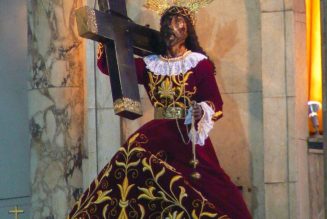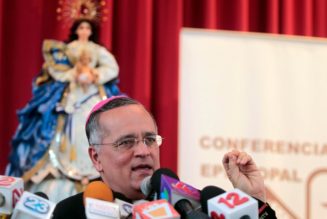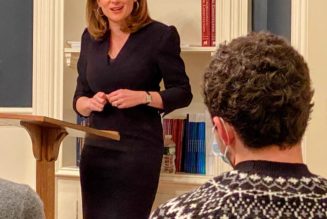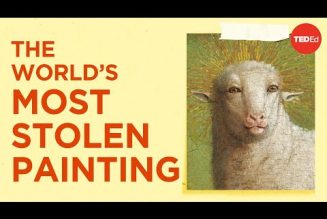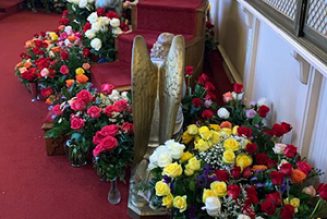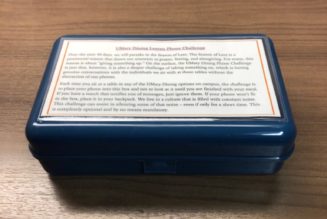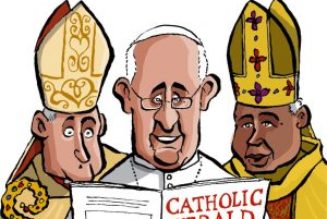, April 30, 2020
 This is Good Shepherd Sunday (the Fourth Sunday of Easter, Year A) when we again review the ways Christ is like a shepherd.
This is Good Shepherd Sunday (the Fourth Sunday of Easter, Year A) when we again review the ways Christ is like a shepherd.
But it is also helpful to look at the ways he is nothing like a shepherd at all.
Jesus Christ’s shepherd qualities are well known.
He is our guide. He is our protector. He prods us back when we start to go astray. He leaves the 99 behind to search for us when we are lost.
Sunday’s Gospel takes his “shepherdness” one step further. The Shepherd’s is the voice we recognize (think about that: Jesus is implying that we are so blind or distracted that he has to shout to keep us on track). He prevents imposter sheep from taking over. He even compares himself to the gate of the sheepfold.
But let’s not forget in Easter the mystery that makes our shepherd utterly unlike every other shepherd: He is also the lamb.
We are used to the paradoxes of Christ: He is the creator of the universe, and a babe in a manger; he is the priest and victim at the sacrifice; he is the alpha and omega; he is our Lord and our brother. Add to that: He is the Good Shepherd who protects the sheep and he is the Lamb who was taken and slain.
Here is where he is most unlike a real shepherd. Real shepherds do not die for their sheep, let alone do what he did.
He is the shepherd who became the lamb. He lived as a lamb to show the sheep how to be better sheep, and then died as a lamb.
This is even more extraordinary when you consider what sheep are like. I know this from a friend who owns sheep: They are not sweet and smart. They are obstinate, hard to train and unpleasant: Unpleasant to smell, unpleasant to handle, unpleasant to have to deal with. For a shepherd to become a lamb is an extraordinary act of love.
For a shepherd to die as the lamb is even greater.
In the second Reading, St. Peter makes the connection to the crucifixion explicit: “He himself bore our sins in his body upon the cross,” he says, “For you had gone astray like sheep, but you have now returned to the shepherd and guardian of your souls.”
The shepherd became a lamb and allowed himself to be attacked by the wolf so that it would leave the other sheep alone.
As Peter says, “He committed no sin, and no deceit was found in his mouth. When he was insulted, he returned no insult; when he suffered, he did not threaten.”
He was led innocent and uncomplaining to the slaughter so that we could go free. Never had anyone seen love like that.
So, how to respond to a love like this? The answer is in the Gospel when it talks about the gate.
St. John Chrysostom said the gate is the Scriptures, and “He that uses not the Scriptures, but climbs up some other way … is a thief.”
So, first step: Stop relying on those who give great advice, and start relying on the infallible advice of Scripture.
Augustine noted that pagans and heretics say “We lead a good life.” But “Indeed those cannot be said to lead a good life, who are either blindly ignorant of, or willfully despise, the end of good living.” To succeed in the spiritual life, he says, you have to seek Christ’s glory, not your own.
“Christ is a lowly door, and he who enters by this door must be lowly.”
How lowly? Jesus Christ was willing to become a sheep, a dirty, mewling, weakling in the flock. What are we wiling to do?
This love makes sense of the first readings.
It makes sense that the early Christians, as we see in Acts, would tirelessly tell anyone who would listen what Jesus had done for them, exposing themselves to contempt to preach Christ.
The deep peace and joy of today’s Psalm also makes sense, too. When the shepherd is willing to become a lamb and be attacked for us, then, truly, “The Lord is my shepherd; there is nothing I shall want.”
And it makes sense that we want to give everything we are — everything — to the one who gave everything he is — everything! — to us.
Image: Wiki-media. Agnus Dei, by Francisco de Zurbarán.
Tags: Fourth Sunday of Easter Year A, prayer, Sunday Gospel, Sunday Readings
Never miss a post! Subscribe below to our weekly newsletter.

